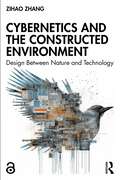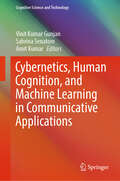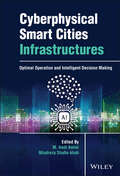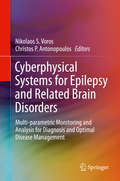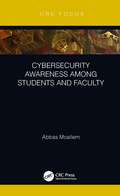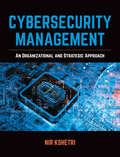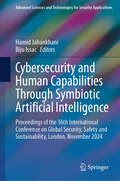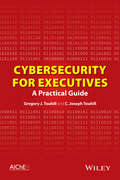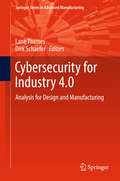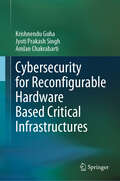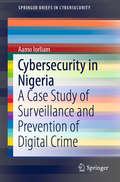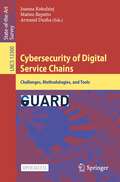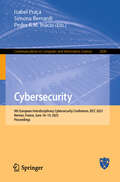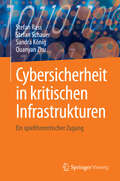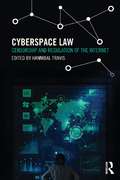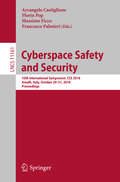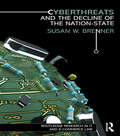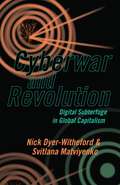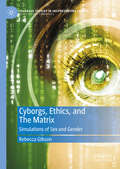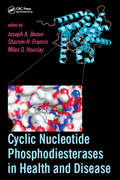- Table View
- List View
Cybernetics and the Constructed Environment: Design Between Nature and Technology
by Zihao ZhangGrounded in contemporary landscape architecture theory and practice, Cybernetics and the Constructed Environment blends examples from art, design, and engineering with concepts from cybernetics and posthumanism, offering a transdisciplinary examination of the ramifications of cybernetics on the constructed environment. Cybernetics, or the study of communication and control in animals and machines, has grown increasingly relevant nearly 80 years after its inception. Cyber-physical systems, sensing networks, and spatial computing—algorithms and intelligent machines—create endless feedback loops with human and non-human actors, co-producing a cybernetic environment. Yet, when an ecosystem is meticulously managed by intelligent machines, can we still call it wild nature? Posthumanism ideas, such as new materialism, actor-network theory, and object-oriented ontology, have become increasingly popular among design disciplines, including landscape architecture, and may have provided transformative frameworks to understand this entangled reality. However, design still entails a sense of intentionality and an urge to control. How do we, then, address the tension between the designer’s intentionality and the co-produced reality of more-than-human agents in the cybernetic environment? Is posthumanism enough to develop a framework to think beyond our all-too-human ways of thinking? For researchers, scholars, practitioners, and students in environmental design and engineering disciplines, this book maps out a paradigm of environmentalism and ecological design rooted in non-communication and uncontrollability, and puts a speculative turn on cybernetics.Chapters 8 and 9 of this book are freely available as a downloadable Open Access PDF at http://www.taylorfrancis.com under a Creative Commons Attribution-Non Commercial-No Derivatives (CC-BY-NC-ND) 4.0 license.
Cybernetics, Human Cognition, and Machine Learning in Communicative Applications (Cognitive Science and Technology)
by Amit Kumar Vinit Kumar Gunjan Sabrina SenatoreThis book presents the fascinating intersection of human cognition and artificial intelligence. Written by leading experts in the fields of cybernetics, cognitive science, and machine learning, this book seeks to bridge the gap between these disciplines and explores the synergies that emerge when humans and machines work together. The book examines the challenges posed by biased data, lack of transparency, and the "black box" nature of some machine learning algorithms. It proposes novel ways to address these issues and foster greater trust and accountability in AI systems. Drawing on cutting-edge research and real-world case studies, it presents a comprehensive and forward-looking perspective on the future of AI and its impact on society. In conclusion, this book offers a compelling exploration of the synergy between human cognition and machine learning, providing insights that are relevant to scholars, researchers, policymakers, and anyone interested in the transformative potential of artificial intelligence.
Cyberphysical Smart Cities Infrastructures: Optimal Operation and Intelligent Decision Making
by M. Hadi Amini Miadreza Shafie-KhahLearn to deploy novel algorithms to improve and secure smart city infrastructure In Cyberphysical Smart Cities Infrastructures: Optimal Operation and Intelligent Decision Making, accomplished researchers Drs. M. Hadi Amini and Miadreza Shafie-Khah deliver a crucial exploration of new directions in the science and engineering of deploying novel and efficient computing algorithms to enhance the efficient operation of the networks and communication systems underlying smart city infrastructure. The book covers special issues on the deployment of these algorithms with an eye to helping readers improve the operation of smart cities. The editors present concise and accessible material from a collection of internationally renowned authors in areas as diverse as computer science, electrical engineering, operation research, civil engineering, and the social sciences. They also include discussions of the use of artificial intelligence to secure the operations of cyberphysical smart city infrastructure and provide several examples of the applications of novel theoretical algorithms. Readers will also enjoy: Thorough introductions to fundamental algorithms for computing and learning, large-scale optimizations, control theory for large-scale systems Explorations of machine learning and intelligent decision making in cyberphysical smart cities, including smart energy systems and intelligent transportation networks In-depth treatments of intelligent decision making in cyberphysical smart city infrastructure and optimization in networked smart cities Perfect for senior undergraduate and graduate students of electrical and computer engineering, computer science, civil engineering, telecommunications, information technology, and business, Cyberphysical Smart Cities Infrastructures is an indispensable reference for anyone seeking to solve real-world problems in smart cities.
Cyberphysical Systems for Epilepsy and Related Brain Disorders: Multi-parametric Monitoring and Analysis for Diagnosis and Optimal Disease Management
by Nikolaos S. Voros Christos P. AntonopoulosThis book introduces a new cyberphysical system that combines clinical and basic neuroscience research with advanced data analysis and medical management tools for developing novel applications for the management of epilepsy. The authors describe the algorithms and architectures needed to provide ambulatory, diagnostic and long-term monitoring services, through multi parametric data collection. Readers will see how to achieve in-hospital quality standards, addressing conventional "routine" clinic-based service purposes, at reduced cost, enhanced capability and increased geographical availability. The cyberphysical system described in this book is flexible, can be optimized for each patient and is demonstrated in several case studies.
Cyberpredators and Their Prey
by Lauren R. ShapiroThe online environment has emerged as a continuous and unfettered source of interpersonal criminal activity beyond physical boundaries. Cyberpredators commit their crimes by employing the Internet and online services—social network platforms, online groups and organizations, smart phone apps, bulletin board systems, online forums, websites, internet relay chat channels—to locate and harm victims of all ages through attacking, exploiting, humiliating, bullying, harassing, threatening, defrauding, and exhorting. Cyberpredators and Their Prey describes non-sexual and sexual interpersonal crimes—online romance scam, swatting, trolling, stalking, bullying, harassment, minor sexting, sexual trafficking, child sexual abuse material, sextortion, and image-based sexual abuse offenses. Each chapter contains: crime definition and relevant issues; typical cyberpredator, motives, and methods; typical victims and behaviors that make them targets; current criminal laws for prosecuting cybercrimes and assessment of their applicability and effectiveness as deterrents; the crime’s impact on individual victims and society in general; and cybersecurity prevention and intervention strategies. Also covered are the unique challenges that the regulation, investigation, and prosecution of these cybercrimes pose to criminal justice and private security agents worldwide; the need for society to hold companies operating online responsible for their role in cybercrime; and how aspects of the online environment (i.e., anonymity, toxic disinhibition, de-individuation, inculpability) contribute to harmful and abusive interpersonal interaction, particularly when enacted by perpetrators as part of a group attack. Key features: Portrays material through multidisciplinary lens of psychology, criminal justice, law, and security Provides consistent, practical information about online criminals and victims Compares online to offline versions of the same crime Discusses adequacy of current laws for prosecuting cybercriminals Considers elements of the online environment that foster criminal activity Describes social engineering techniques Considers the role of intimate partner violence in cybercrimes Reviews 21st century skills needed to educate and protect potential targets Cyberpredators and Their Prey will prove essential reading to those who are studying to become, or are currently, security professionals; law enforcement personnel and investigators; intelligence agents; private investigators; lawyers; compliance officers; social service workers; and other professionals who deal with interpersonal cybercrime through the lens of social science.
Cybersecurity Awareness Among Students and Faculty
by Abbas MoallemIn modern times, all individuals need to be knowledgeable about cybersecurity. They must have practical skills and abilities to protect themselves in cyberspace. What is the level of awareness among college students and faculty, who represent the most technologically active portion of the population in any society? According to the Federal Trade Commission’s 2016 Consumer Sentinel Network report, 19 percent of identity theft complaints came from people under the age of 29. About 74,400 young adults fell victim to identity theft in 2016. This book reports the results of several studies that investigate student and faculty awareness and attitudes toward cybersecurity and the resulting risks. It proposes a plan of action that can help 26,000 higher education institutions worldwide with over 207 million college students, create security policies and educational programs that improve security awareness and protection. Features Offers an understanding of the state of privacy awareness Includes the state of identity theft awareness Covers mobile phone protection Discusses ransomware protection Discloses a plan of action to improve security awareness
Cybersecurity Management: An Organizational and Strategic Approach
by Nir KshetriCyberthreats are among the most critical issues facing the world today. Cybersecurity Management draws on case studies to analyze cybercrime at the macro level, and evaluates the strategic and organizational issues connected to cybersecurity. Cross-disciplinary in its focus, orientation, and scope, this book looks at emerging communication technologies that are currently under development to tackle emerging threats to data privacy. Cybersecurity Management provides insights into the nature and extent of cyberthreats to organizations and consumers, and how such threats evolve with new technological advances and are affected by cultural, organizational, and macro‐environmental factors. Cybersecurity Management articulates the effects of new and evolving information, communication technologies, and systems on cybersecurity and privacy issues. As the COVID-19 pandemic has revealed, we are all dependent on the Internet as a source for not only information but also person-to-person connection, thus our chances of encountering cyberthreats is higher than ever. Cybersecurity Management aims to increase the awareness of and preparedness to handle such threats among policy-makers, planners, and the public.
Cybersecurity and Human Capabilities Through Symbiotic Artificial Intelligence: Proceedings of the 16th International Conference on Global Security, Safety and Sustainability, London, November 2024 (Advanced Sciences and Technologies for Security Applications)
by Hamid Jahankhani Biju IssacThis book presents the 16th ICGS3-24 conference which aims to understand the full impact of cyber-security, AI, deepfake, and quantum computing on humanity. Over the last two decades, technology relating to cyber-space (satellites, drones, UAVs), cyber-security, artificial intelligence, and generative AI has evolved rapidly. Today, criminals have identified rewards from online frauds; therefore, the risks and threats of cyber-attacks have increased too. Detection of the threat is another strand to the strategy and will require dynamic risk management techniques, strong and up-to-date information governance standards, and frameworks with AI responsive approaches in order to successfully monitor and coordinate efforts between the parties. Thus, the ability to minimize the threats from cyber is an important requirement. This will be a mission-critical aspect of the strategy with development of the right cyber-security skills, knowledge, and culture that are imperative for the implementation of the cyber-strategies. As a result, the requirement for how AI Demand will influence business change and thus influence organizations and governments is becoming important. In an era of unprecedented volatile, political, and economic environment across the world, computer-based systems face ever more increasing challenges, disputes, and responsibilities while the Internet has created a global platform for the exchange of ideas, goods, and services; however, it has also created boundless opportunities for cyber-crime. The ethical and legal implications of connecting the physical and digital worlds and presenting the reality of a truly interconnected society present the realization of the concept of smart societies. Drawing on 15 years of successful events, the 16th ICGS3-24 conference aims to provide attendees with an information-packed agenda with representatives from across the industry and the globe. This Annual International Conference is an established platform in which security, safety, and sustainability issues can be examined from several global perspectives through dialogue between academics, students, government representatives, chief executives, security professionals, and research scientists from the UK and from around the globe.
Cybersecurity for Executives: A Practical Guide
by C. Joseph Touhill Gregory J. TouhillPractical guide that can be used by executives to make well-informed decisions on cybersecurity issues to better protect their business Emphasizes, in a direct and uncomplicated way, how executives can identify, understand, assess, and mitigate risks associated with cybersecurity issues Covers 'What to Do When You Get Hacked?' including Business Continuity and Disaster Recovery planning, Public Relations, Legal and Regulatory issues, and Notifications and Disclosures Provides steps for integrating cybersecurity into Strategy; Policy and Guidelines; Change Management and Personnel Management Identifies cybersecurity best practices that executives can and should use both in the office and at home to protect their vital information
Cybersecurity for Industry 4.0: Analysis for Design and Manufacturing (Springer Series in Advanced Manufacturing)
by Dirk Schaefer Lane ThamesThis book introduces readers to cybersecurity and its impact on the realization of the Industry 4. 0 vision. It covers the technological foundations of cybersecurity within the scope of the Industry 4. 0 landscape and details the existing cybersecurity threats faced by Industry 4. 0, as well as state-of-the-art solutions with regard to both academic research and practical implementations. Industry 4. 0 and its associated technologies, such as the Industrial Internet of Things and cloud-based design and manufacturing systems are examined, along with their disruptive innovations. Further, the book analyzes how these phenomena capitalize on the economies of scale provided by the Internet. The book offers a valuable resource for practicing engineers and decision makers in industry, as well as researchers in the design and manufacturing communities and all those interested in Industry 4. 0 and cybersecurity.
Cybersecurity for Reconfigurable Hardware Based Critical Infrastructures
by Amlan Chakrabarti Jyoti Prakash Singh Krishnendu GuhaThe book commences with an introductory section on reconfigurable computing and thereafter delves into its applications in critical infrastructures. This book analyzes how such systems may be affected due to vulnerabilities and also discusses how these can be attacked by adversaries or cybercriminals. This book also discusses protection mechanisms related to such threats. It initially starts with an introduction to the various industrial revolutions and the changes in security needs, followed by a basic description of reconfigurable hardware based critical infrastructures. Further, the book contains discussion on security administration and planning, auditing, monitoring and analysis, risk-response and recovery, control and countermeasures highlighting their need in reconfigurable hardware-based platforms. In addition to these, new concepts are introduced such as AI/ML for cybersecurity, digital forensics related to reconfigurable hardware based critical infrastructures. Finally, a hands on learning experience is presented to provide the readers with a practical flavour. The book will be useful to students (graduate and undergraduate), researchers, academicians and industry professionals.
Cybersecurity in France (SpringerBriefs in Cybersecurity)
by Philippe BaumardThis Brief presents the overarching framework in which each nation is developing its own cyber-security policy, and the unique position adopted by France. Modern informational crises have penetrated most societal arenas, from healthcare, politics, economics to the conduct of business and welfare. Witnessing a convergence between information warfare and the use of "fake news", info-destabilization, cognitive warfare and cyberwar, this book brings a unique perspective on modern cyberwarfare campaigns, escalation and de-escalation of cyber-conflicts. As organizations are more and more dependent on information for the continuity and stability of their operations, they also become more vulnerable to cyber-destabilization, either genuine, or deliberate for the purpose of gaining geopolitical advantage, waging wars, conducting intellectual theft and a wide range of crimes. Subsequently, the regulation of cyberspace has grown into an international effort where public, private and sovereign interests often collide. By analyzing the particular case of France national strategy and capabilities, the authors investigate the difficulty of obtaining a global agreement on the regulation of cyber-warfare. A review of the motives for disagreement between parties suggests that the current regulation framework is not adapted to the current technological change in the cybersecurity domain. This book suggests a paradigm shift in handling and anchoring cyber-regulation into a new realm of behavioral and cognitive sciences, and their application to machine learning and cyber-defense.
Cybersecurity in Nigeria: A Case Study of Surveillance and Prevention of Digital Crime (SpringerBriefs in Cybersecurity)
by Aamo IorliamThis book reviews the use of digital surveillance for detecting, investigating and interpreting fraud associated with critical cyberinfrastructures in Nigeria, as it is well known that the country’s cyberspace and cyberinfrastructures are very porous, leaving too much room for cyber-attackers to freely operate. In 2017, there were 3,500 successful cyber-attacks on Nigerian cyberspace, which led to the country losing an estimated 450 million dollars. These cybercrimes are hampering Nigeria’s digital economy, and also help to explain why many Nigerians remain skeptical about Internet marketing and online transactions. If sensitive conversations using digital devices are not well monitored, Nigeria will be vulnerable to cyber-warfare, and its digital economy, military intelligence, and related sensitive industries will also suffer. The Nigerian Army Cyber Warfare Command was established in 2018 in order to combat terrorism, banditry, and other attacks by criminal groups in Nigeria. However, there remains an urgent need to produce digital surveillance software to help law enforcement agencies in Nigeria to detect and prevent these digitally facilitated crimes. The monitoring of Nigeria’s cyberspace and cyberinfrastructure has become imperative, given that the rate of criminal activities using technology has increased tremendously. In this regard, digital surveillance includes both passive forensic investigations (where an attack has already occurred) and active forensic investigations (real-time investigations that track attackers). In addition to reviewing the latest mobile device forensics, this book covers natural laws (Benford’s Law and Zipf’s Law) for network traffic analysis, mobile forensic tools, and digital surveillance software (e.g., A-BOT). It offers valuable insights into how digital surveillance software can be used to detect and prevent digitally facilitated crimes in Nigeria, and highlights the benefits of adopting digital surveillance software in Nigeria and other countries facing the same issues.
Cybersecurity of Digital Service Chains: Challenges, Methodologies, and Tools (Lecture Notes in Computer Science #13300)
by Joanna Kołodziej Matteo Repetto Armend DuzhaThis open access book presents the main scientific results from the H2020 GUARD project. The GUARD project aims at filling the current technological gap between software management paradigms and cybersecurity models, the latter still lacking orchestration and agility to effectively address the dynamicity of the former. This book provides a comprehensive review of the main concepts, architectures, algorithms, and non-technical aspects developed during three years of investigation; the description of the Smart Mobility use case developed at the end of the project gives a practical example of how the GUARD platform and related technologies can be deployed in practical scenarios. We expect the book to be interesting for the broad group of researchers, engineers, and professionals daily experiencing the inadequacy of outdated cybersecurity models for modern computing environments and cyber-physical systems.
Cybersecurity: 9th European Interdisciplinary Cybersecurity Conference, EICC 2025, Rennes, France, June 18–19, 2025, Proceedings (Communications in Computer and Information Science #2500)
by Simona Bernardi Isabel Praça Pedro R.M. InácioThis book constitutes the proceedings of the 9th European Interdisciplinary Cybersecurity Conference, EICC 2025, which took place in Rennes, France, during June 18–19, 2025. The 21 full papers and 2 short papers included in these proveedings were carefully reviewed and selected from 39 submissions. They were organized in topical sections as follows: Artificial intelligence applied to cybersecurity; cybercrime and cyberthreats; cybersecurity; software development security; advances in interdisciplinary cybersecurity: insights from funded reserach projects - CyFRP 2025 special session; complex network analysis for cybersecurity - CNACYS 2025 special session; medical device security and privacy - MeDSec 2025 special session; MDCG guidance; threshold multiparty private set intersection.
Cybersicherheit in kritischen Infrastrukturen: Ein spieltheoretischer Zugang
by Quanyan Zhu Stefan Rass Stefan Schauer Sandra KönigDieses Buch stellt ein Kompendium ausgewählter spiel- und entscheidungstheoretischer Modelle zur Erreichung und Bewertung der Sicherheit kritischer Infrastrukturen vor. Angesichts aktueller Berichte über Sicherheitsvorfälle verschiedenster Art lässt sich ein Paradigmenwechsel hin zu immer heterogeneren Angriffen erkennen. Hierbei werden verschiedene Techniken kombiniert werden, was zu einer fortgeschrittenen, anhaltenden Bedrohung führen kann. Sicherheitsvorkehrungen müssen diesen vielfältigen Bedrohungsmustern in ebenso vielfältiger Weise gerecht werden. Als Antwort darauf bietet dieses Buch eine Fülle von Techniken zum Schutz vor und zur Abschwächung von IT-Angriffen. Ein Großteil der traditionellen Sicherheitsforschung konzentriert sich auf bestimmte Angriffsszenarien oder Anwendungen und ist bestrebt, einen Angriff "praktisch unmöglich" zu machen. Ein neueres Sicherheitskonzept betrachtet die Sicherheit als ein Szenario, in dem die Kosten eines Angriffs den möglichen Nutzen übersteigen. Dies schließt die Möglichkeit eines Angriffs nicht aus, sondern minimiert die Wahrscheinlichkeit eines solchen auf das geringstmögliche Risiko. Das Buch folgt dieser ökonomischen Definition von Sicherheit und bietet eine managementwissenschaftliche Sichtweise, die ein Gleichgewicht zwischen Sicherheitsinvestitionen und dem daraus resultierenden Nutzen anstrebt. Es konzentriert sich auf die Optimierung von Ressourcen angesichts von Bedrohungen wie Terrorismus und fortgeschrittenen, anhaltenden Bedrohungen. Ausgehend von der Erfahrung der Autoren und inspiriert von realen Fallstudien bietet das Buch einen systematischen Ansatz für die Sicherheit und Widerstandsfähigkeit kritischer Infrastrukturen. Das Buch ist eine Mischung aus theoretischer Arbeit und praktischen Erfolgsgeschichten und richtet sich vor allem an Studenten und Praktiker, die eine Einführung in spiel- und entscheidungstheoretische Techniken für die Sicherheit suchen. Die erforderlichen mathematischen Konzepte sind in sich abgeschlossen, werden rigoros eingeführt und durch Fallstudien illustriert. Das Buch bietet auch Software-Tools, die den Leser bei der praktischen Anwendung der wissenschaftlichen Modelle und Berechnungsrahmen unterstützen. Dieses Buch ist eine Übersetzung einer englischen Originalausgabe. Die Übersetzung wurde mit Hilfe von künstlicher Intelligenz (maschinelle Übersetzung durch den Dienst DeepL.com) erstellt. Eine anschließende menschliche Überarbeitung erfolgte vor allem in Bezug auf den Inhalt, so dass sich das Buch stilistisch anders liest als eine herkömmliche Übersetzung.
Cyberspace Law: Censorship and Regulation of the Internet (Routledge Research in Information Technology and E-Commerce Law)
by Hannibal TravisThis book explores what the American Civil Liberties Union calls the "third era" in cyberspace, in which filters "fundamentally alter the architectural structure of the Internet, with significant implications for free speech." Although courts and nongovernmental organizations increasingly insist upon constitutional and other legal guarantees of a freewheeling Internet, multi-national corporations compete to produce tools and strategies for making it more predictable. When Google attempted to improve our access to information containing in books and the World Wide Web, copyright litigation began to tie up the process of making content searchable, and resulted in the wrongful removal of access to thousands if not millions of works. Just as the courts were insisting that using trademarks online to criticize their owners is First Amendment-protected, corporations and trade associations accelerated their development of ways to make Internet companies liable for their users’ infringing words and actions, potentially circumventing free speech rights. And as social networking and content-sharing sites have proliferated, so have the terms of service and content-detecting tools for detecting, flagging, and deleting content that makes one or another corporation or trade association fear for its image or profits. The book provides a legal history of Internet regulation since the mid-1990s, with a particular focus on efforts by patent, trademark, and copyright owners to compel Internet firms to monitor their online offerings and remove or pay for any violations of the rights of others. This book will be of interest to students of law, communications, political science, government and policy, business, and economics, as well as anyone interested in free speech and commerce on the internet.
Cyberspace Safety and Security: 10th International Symposium, CSS 2018, Amalfi, Italy, October 29–31, 2018, Proceedings (Lecture Notes in Computer Science #11161)
by Florin Pop Arcangelo Castiglione Francesco Palmieri Massimo FiccoThis book constitutes the proceedings of the 10th International Symposium on Cyberspace Safety and Security, CSS 2018, held in Amalfi, Italy, in October 2018. The 25 full papers presented in this volume were carefully reviewed and selected from 79 submissions.The papers focus on cybersecurity; cryptography, data security, and biometric techniques; and social security, ontologies, and smart applications.
Cyberthreats and the Decline of the Nation-State: Cyberthreats And The Decline Of The Nation-state (Routledge Research in Information Technology and E-Commerce Law)
by Susan W. BrennerThis book explores the extraordinary difficulties a nation-state’s law enforcement and military face in attempting to prevent cyber-attacks. In the wake of recent assaults including the denial of service attack on Estonia in 2007 and the widespread use of the Zeus Trojan Horse software, Susan W. Brenner explores how traditional categories and procedures inherent in law enforcement and military agencies can obstruct efforts to respond to cyberthreats. Brenner argues that the use of a territorially-based system of sovereignty to combat cyberthreats is ineffective, as cyberspace erodes the import of territory. This problem is compounded by the nature of cybercrime as a continually evolving phenomenon driven by rapid and complex technological change. Following an evaluation of the efficacy of the nation-state, the book goes on to explore how individuals and corporations could be integrated into a more decentralized, distributed system of cyberthreat control. Looking at initiatives in Estonia and Sweden which have attempted to incorporate civilians into their cyber-response efforts, Brenner suggests that civilian involvement may mediate the rigid hierarchies that exist among formal agencies and increase the flexibility of any response. This book will be of great interest to students and researchers of information technological law and security studies.
Cyberwar and Revolution: Digital Subterfuge in Global Capitalism
by Svitlana Matviyenko Nick Dyer-WithefordUncovering the class conflicts, geopolitical dynamics, and aggressive capitalism propelling the militarization of the internet Global surveillance, computational propaganda, online espionage, virtual recruiting, massive data breaches, hacked nuclear centrifuges and power grids—concerns about cyberwar have been mounting, rising to a fever pitch after the alleged Russian hacking of the U.S. presidential election and the Cambridge Analytica scandal. Although cyberwar is widely discussed, few accounts undertake a deep, critical view of its roots and consequences. Analyzing the new militarization of the internet, Cyberwar and Revolution argues that digital warfare is not a bug in the logic of global capitalism but rather a feature of its chaotic, disorderly unconscious. Urgently confronting the concept of cyberwar through the lens of both Marxist critical theory and psychoanalysis, Nick Dyer-Witheford and Svitlana Matviyenko provide a wide-ranging examination of the class conflicts and geopolitical dynamics propelling war across digital networks.Investigating the subjectivities that cyberwar mobilizes, exploits, and bewilders, and revealing how it permeates the fabric of everyday life and implicates us all in its design, this book also highlights the critical importance of the emergent resistance to this digital militarism—hacktivism, digital worker dissent, and off-the-grid activism—for effecting different, better futures.
Cyborg Selves: A Theological Anthropology of the Posthuman (Routledge Science and Religion Series)
by Jeanine Thweatt-BatesWhat is the 'posthuman'? Is becoming posthuman inevitable-something which will happen to us, or something we will do to ourselves? Why do some long for it, while others fearfully reject it? These questions underscore the fact that the posthuman is a name for the unknown future, and therefore, not a single idea but a jumble of competing visions - some of which may be exciting, some of which may be frightening, and which is which depends on who you are, and what you desire to be. This book aims to clarify current theological and philosophical dialogue on the posthuman by arguing that theologians must pay attention to which form of the posthuman they are engaging, and to demonstrate that a 'posthuman theology' is not only possible, but desirable, when the vision of the posthuman is one which coincides with a theological vision of the human.
Cyborgs, Ethics, and The Matrix: Simulations of Sex and Gender (Palgrave Studies in (Re)Presenting Gender)
by Rebecca GibsonThe Matrix (Lana Wachowski and Lilly Wachowski 1999) has permeated our cultural consciousness for two decades, working its way into such common parlance as “a glitch in the Matrix,” and the idea of taking the Red Pill. With the release of the fourth movie, The Matrix Resurrections (Lana Wachowski 2021), and the confirmation of the franchise being a metaphor for gender transition, this book examines how the entire franchise contributes to the discourse on sex and gender, and how it has been instrumental in propelling the creation of new types of cyborg technology. This book centers on the main philosophical theme of The Matrix, know thyself, and relate it to the quest for authenticity which creates our identities—be they human, or human “enough”—as we move through the world.
Cycles of Invention and Discovery
by Venkatesh NarayanamurtiUsing Nobel Prize-winning examples like the transistor, laser, and magnetic resonance imaging, Venky Narayanamurti and Tolu Odumosu explore the daily micro-practices of research and show that distinctions between the search for knowledge and creative problem solving break down when one pays attention to how pathbreaking research actually happens.
Cycles of Time
by Roger PenroseFrom the best-selling author of The Emperor's New Mind and The Road to Reality, a groundbreaking book that provides new views on three of cosmology's most profound questions: What, if anything, came before the Big Bang? What is the source of order in our universe? What is its ultimate future?Current understanding of our universe dictates that all matter will eventually thin out to zero density, with huge black holes finally evaporating away into massless energy. Roger Penrose--one of the most innovative mathematicians of our time--turns around this predominant picture of the universe's "heat death," arguing how the expected ultimate fate of our accelerating, expanding universe can actually be reinterpreted as the "Big Bang" of a new one.Along the way to this remarkable cosmological picture, Penrose sheds new light on basic principles that underlie the behavior of our universe, describing various standard and nonstandard cosmological models, the fundamental role of the cosmic microwave background, and the key status of black holes. Ideal for both the amateur astronomer and the advanced physicist--with plenty of exciting insights for each--Cycles of Time is certain to provoke and challenge.Intellectually thrilling and accessible, this is another essential guide to the universe from one of our preeminent thinkers.From the Hardcover edition.
Cyclic Nucleotide Phosphodiesterases in Health and Disease
by Miles D. Houslay Sharron H. Francis Joseph A. BeavoSince the last major compendium dedicated to cyclic nucleotide phosphodiesterases (PDEs) was published over 15 years ago, an enormous amount of progress has occurred in the field. There is great need for a centralized source for key information in this burgeoning and therapeutically important area of medical research. Cyclic Nucleotide Phosph
